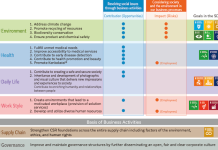As we wrote on 27 May 2019, (Anti-dumping inquiry on offset printing plates initiated), TechNova had initiated the imposition of anti-dumping duty on imported offset plates with the directorate general of trade remedies (DGTR) of the Ministry of Commerce of the Government of India. The DGTR via F. No.6/7/2019 issued its preliminary findings of 3 October 2019. The preliminary findings issued as a 57-page PDF document looks at the submissions by TechNova and various Indian importers of offset plates and exporters of offset plates to India.
Readers will remember that it was on 1 June 2018 that the anti-dumping duties on the import of digital offset plates from China, instituted in 2012 for five years, were rescinded (Anti-dumping duties on import of digital offset printing plates from China rescinded on 1 June 2018). These were to have expired in 2017 but were extended for one year, and a sunset review was initiated. The findings were – that continuation of the anti-dumping duties was no longer warranted.
As we wrote in May 2019, in the past year, TechNova has itself been importing offset plates from China for sale in India. Perhaps this was a way of gathering the information that helped it in its current application to have anti-dumping duties imposed again. Offset plate importers and traders commented that the largest Indian plate manufacturer is itself importing plates to satisfy the Indian market in significant quantities. In that case, how can it claim that it fulfills Indian printers’ needs as far as quality, quantity, and in terms of price-performance? We have over the years spoken to Indian printers who are in fact, impressed by the quality, competitiveness, and ready availability of imported offset plates.
We have briefly looked through the 57-page preliminary findings that suggest (in our reading) a re-imposition of anti-dumping duty to the extent of $0.0 for Kodak and Fuji China to $.89 per square meter for one of the Korean plate exporters. You can download the DGTR report by clicking on this link. While the earlier anti-dumping duty applied mainly to China, the preliminary findings this time find that offset plates sourced from China, Japan, Korea, Taiwan, and Vietnam are under-priced. And in fact, damaging to TechNova’s market share and to its profitability – by varying extents by manufacturer and country. Industry experts say that the preliminary suggestion of the anti-dumping duty, if imposed, will cost printers approximately Rs. 40 per square meter more than they are currently paying.
The DGTR contacted various Asian manufacturers and importers of plates to fill out questionnaires, and most of them responded. The importers who responded include Kapoor Imaging Private Limited, Fujifilm India Private Limited, Kodak India Private Limited, Bright Enterprises, and Nippon Color. Additional legal submissions were received from The All India Federation of Master Printers, HT Media Ltd, Metrostar Print Solutions Pvt. Ltd, Government of Korea, Government of Taiwan, and Toray Industries, Inc.
Printers oppose anti-dumping duty on offset plates
Individual printers and various printing associations are opposed to the re-imposition of anti-dumping duties on imported offset plates. Some are already sending their objections to the concerned departments and the Ministry of Commerce of the government. Even within the PDF document, which is relatively opaque, one can see that the industry has grown as has the demand for imported offset plates.
The royalty that TechNova pays to Agfa is not stated in the report, nor are its overall costs and viability made clear – only that it has lost market share and that imports of offset plates from multiple countries have grown. It is difficult to understand why so many manufacturers would sell relatively smaller quantities of offset plates to India at a loss. At the same time, why is it that TechNova, with its near or virtual monopoly of a large and growing home market, cannot viably compete in quality and or price-performance given its local costs, logistics, and close to customer servicing. High-quality offset plates at fair market prices are seen as a critical input that can continue to keep the printing industry viable and continue to support its exports of printed books and packaging.









